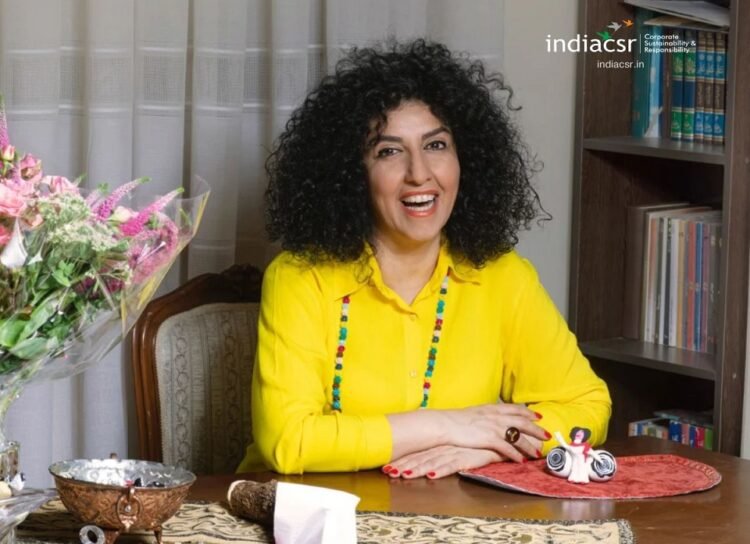- Narges Mohammadi’s Nobel Prize celebrates her dedication to human and women’s rights in Iran.
- Despite 13 arrests and 31 years in prison, she stands as a symbol of unwavering courage.
- Her win underscores the global significance of women’s rights amidst Iran’s political turbulence.
Narges Mohammadi has been awarded the 2023 Nobel Peace Prize for her unwavering commitment to advancing human rights and freedom, particularly for women in Iran. Despite enduring 13 arrests, five convictions, and a total of 31 years in prison, Mohammadi’s relentless voice continues to resonate from Tehran’s Evin Prison, symbolizing the ongoing struggle for human rights and gender equality in Iran.
Narges Mohammadi Wins Nobel Peace Prize
In a significant announcement from Oslo, the Norwegian Nobel Committee revealed that Narges Mohammadi is the recipient of the 2023 Nobel Peace Prize. She is being honored for her relentless efforts in combatting the oppression of women in Iran and her unwavering commitment to advancing human rights and freedom for all. Narges Mohammadi’s name has become a symbol of the struggle for human rights in Iran, a battle that has exacted a high personal toll.
Narges Mohammadi’s Relentless Resilience
During the announcement ceremony, Berit Reiss-Andersen, chair of the Norwegian Nobel Committee, revealed a staggering reality: Narges Mohammadi has endured 13 arrests, five convictions, and has been sentenced to a total of 31 years in prison, along with 154 lashes by the regime. As Reiss-Andersen spoke, she emphasized that Ms. Mohammadi remains imprisoned even now within the grim confines of Tehran’s notorious Evin Prison. Despite these harrowing circumstances, Mohammadi’s unwavering voice continues to resonate, undaunted.
Narges Mohammadi’s Defiant Voice
In an exclusive audio recording from within Evin Prison, shared with CNN prior to Friday’s announcement, 51-year-old Narges Mohammadi can be heard leading chants of “woman, life, freedom.” This powerful slogan emerged during the uprising sparked by the tragic death of 22-year-old Mahsa Amini, who died in the custody of Iran’s morality police due to allegations of improperly wearing her headscarf.
The recording briefly pauses as an automated message interjects, declaring, “This is a phone call from Evin Prison.” In that moment, the women’s voices unite in singing a Farsi rendition of “Bella Ciao,” the 19th-century Italian folk song that evolved into a symbol of resistance against Fascist forces and has been embraced by Iran’s freedom movement.
In her written responses to questions relayed through intermediaries, Mohammadi expressed, “This period was and still is the era of greatest protest in this prison.” Her unwavering spirit and dedication to the cause shine brightly amid adversity.
Narges Mohammadi’s Remarkable Victory
In this poignant image captured during her medical furlough from prison in Tehran in 2021, Narges Mohammadi’s resilience shines through.
Henrik Urdal, the director of the Peace Research Institute Oslo, hails Mohammadi’s Nobel Peace Prize as “a tremendous achievement for women’s rights in Iran.” He emphasizes that women in Iran have tirelessly fought for equality and freedom for generations, with the tragic passing of Mahsa Amini serving as a pivotal moment against oppression and violence.
Urdal further underlines the global significance of today’s laureate, unjustly incarcerated in Tehran, as she sends a resounding message to Iran’s leadership: that women’s rights are an essential and universal concern that transcends borders.
Narges Mohammadi’s Recognition Amidst Iranian Upheaval
Narges Mohammadi’s Nobel Peace Prize acknowledgment follows a tumultuous year in Iran, ignited by the tragic death of Mahsa Amini. What began as a response to her passing evolved into widespread nationwide protests that endured for months.
Berit Reiss-Andersen characterized this upheaval as “the largest political demonstrations against Iran’s theocratic regime since it came to power in 1979.” However, these impassioned protests were met with a brutal government crackdown, resulting in a devastating toll. Reiss-Andersen grimly recounted the staggering figures: “More than 500 demonstrators were killed. Thousands sustained injuries, with many left blinded by rubber bullets fired by the police. At least 20,000 individuals were arrested and detained.”
Anniversary of Mahsa Amini’s Death Sparks Nationwide Protests
The one-year anniversary of Mahsa Amini’s tragic passing, observed last month, triggered a wave of demonstrations across several Iranian cities, as captured in videos obtained by CNN. The protests extended to Tehran, Mashad, Ahvaz, Lahijan, Arak, and the Kurdish city of Senandaj.
Amidst the fervor, numerous protesters passionately chanted “Woman, Life, Freedom,” while others voiced slogans expressing their discontent with Iranian Supreme Leader Ali Khamenei.
In conclusion, Narges Mohammadi’s Nobel Peace Prize victory serves as a testament to her unyielding commitment to human rights and women’s rights in Iran. Her remarkable resilience in the face of adversity and imprisonment has made her a beacon of hope and a symbol of courage. Furthermore, this recognition underscores the universal importance of women’s rights, sending a powerful message that transcends borders, particularly in the context of Iran’s recent political turmoil. Narges Mohammadi’s journey and Nobel win inspire us all to continue the struggle for equality and freedom worldwide.
Copyright@ India CSR







